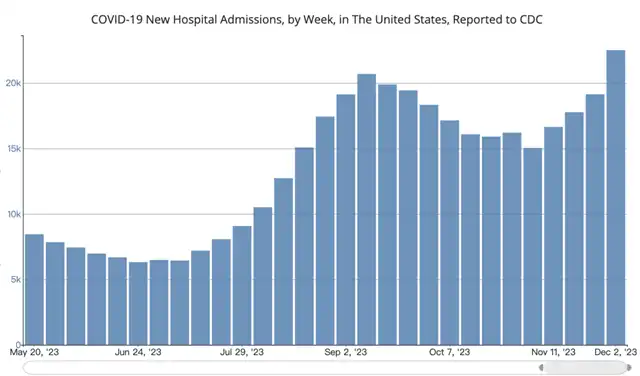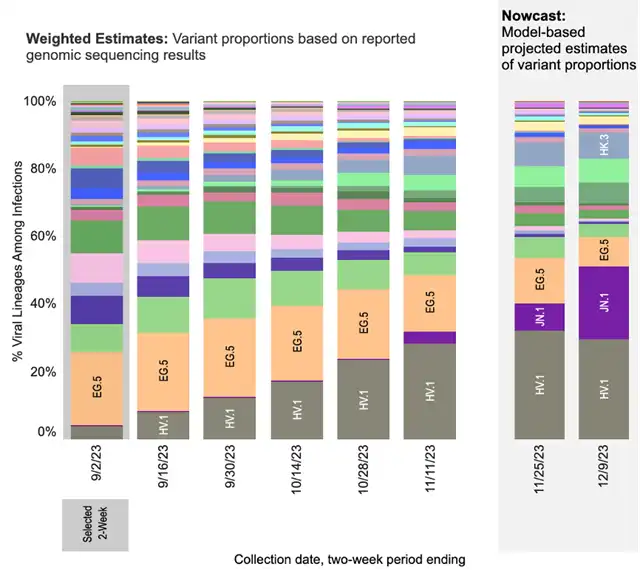Surge in New COVID Variant JN.1: Over 20000 Hospitalizations in US
- Normal Liver Cells Found to Promote Cancer Metastasis to the Liver
- Nearly 80% Complete Remission: Breakthrough in ADC Anti-Tumor Treatment
- Vaccination Against Common Diseases May Prevent Dementia!
- New Alzheimer’s Disease (AD) Diagnosis and Staging Criteria
- Breakthrough in Alzheimer’s Disease: New Nasal Spray Halts Cognitive Decline by Targeting Toxic Protein
- Can the Tap Water at the Paris Olympics be Drunk Directly?
Surge in New COVID Variant JN.1: Over 20000 Hospitalizations in US
- Should China be held legally responsible for the US’s $18 trillion COVID losses?
- CT Radiation Exposure Linked to Blood Cancer in Children and Adolescents
- FDA has mandated a top-level black box warning for all marketed CAR-T therapies
- Can people with high blood pressure eat peanuts?
- What is the difference between dopamine and dobutamine?
- How long can the patient live after heart stent surgery?
Surge in New COVID Variant JN.1: Over 20000 Hospitalizations in US
In recent days, the global attention has been drawn to the emergence of the new COVID variant JN.1, which has been rapidly spreading worldwide over the past month.
Reports indicate that the number of COVID patients hospitalized in the United States has sharply increased in recent weeks, rising from a historic low of 5,631 in July to 12,450 on December 2.
According to CDC data, the number of COVID hospitalizations in the United States has exceeded 20,000 in the past week.
Mandy Cohen, director of the CDC, stated in a press conference that the virus is causing approximately 15,000 hospitalizations and 1,000 deaths per week.
Additionally, the CDC’s wastewater monitoring program has observed a significant increase in the viral load of the COVID virus, further confirming the severity of the recent surge.

Source: US CDC
New Variant JN.1 Rapidly Spreading Globally
JN.1 is a variant of the COVID virus, branching from the BA.2.86 variant. Although this mutation was first identified in the United States in August of this year, its spread was slow. As of November 27, the CDC’s real-time forecast of COVID variants indicated that BA.2.86 (including its branches) accounted for only 5-15% of the monitored variants, with the dominant variant at that time being HV.1.
However, recent monitoring has shown an increase in the infection rate of JN.1 in the population.
According to the latest CDC real-time forecast on December 9, the proportion of JN.1 in monitored COVID variants has risen from less than 0.1% on September 2 to 3.5% on November 11. It is projected to further increase to 21.4% by December 9, surpassing the previously most common variant, HV.1 (29.6%).
On December 8, the CDC provided updated intelligence on the prevalence of JN.1, stating that it now accounts for 15-29% of the monitored COVID variants in the United States. The current estimated likelihood is around 21%, but the reliability of this prediction is low.

The proportion of JN.1 (purple) among the new coronavirus variants monitored by the CDC (Source: CDC)
Rapid Spread of JN.1 Beyond the United States
According to the European Centre for Disease Prevention and Control (ECDC) weekly report on infectious diseases for the 49th week of 2023, COVID infections top the respiratory pathogen monitoring list with a median positive rate of 19%. BA.2.86 (including JN.1, as per ECDC’s data) constitutes 26% of the monitored COVID variants. In some EU countries, the proportion of BA.2.86 exceeds 40%, such as Iceland (52.3%), Spain (48.6%), Norway (41.7%), and Belgium (40.4%).
Moreover, JN.1’s global spread has surpassed BA.2.86 and its other branches. According to data from the Massachusetts Institute of Technology’s Ian Wickersham Laboratory, from October 1 to November 22, the detection rate of JN.1 globally has risen from 0 to over 15%, while BA.2.86 and its various branches have consistently remained below 5%, with recent further decreases.
However, some studies have shown that antiviral drugs still maintain strong activity against the JN.1 variant, mainly because the JN.1 variant does not have mutations that affect the activity of antiviral drugs like the XBB variant [8 ] ; On the other hand, some studies [9] show that the new coronavirus vaccine containing XBB variant components can still effectively resist JN.1 variant infection; more importantly, no pathogenicity of JN.1 has been observed so far. Increase.
Therefore, public health departments in various countries are currently optimistic about the possible impact of the JN.1 variant.
The U.S. CDC stated in the article that there is currently no evidence that the JN.1 variant poses a greater risk to public health than other circulating strains of the new coronavirus. Moreover, the existing vaccines, etiological detection methods and Treatments are still effective against JN.1 variant infections. The European ECDC also stated in its weekly report that it will further monitor the prevalence of BA.2.86 and its branches and will update the monitoring results in a timely manner.
At the same time, the current increase in hospitalizations for new coronavirus infections has not exceeded the data in 2021 and 2022.
Surge in New COVID Variant JN.1: Over 20000 Hospitalizations in US
References:
[1]https://www.nbcnews.com/health/health-news/covid-variants-know-jn1-ba286-rcna127648
[2]https://www.cdc.gov/nwss/rv/COVID19-nationaltrend.html
[3]https://www.cdc.gov/respiratory-viruses/whats-new/covid-19-variant-update-2023-11-27.html
[4]https://covid.cdc.gov/covid-data-tracker/#variant-proportions
[5]https://www.cdc.gov/respiratory-viruses/whats-new/SARS-CoV-2-variant-JN.1.html
[6]https://www.ecdc.europa.eu/sites/default/files/documents/communicable-disease-threats-report-week-49-2023.pdf
[7]Fast evolution of SARS-CoV-2 BA.2.86 to JN.1 under heavy immune pressure. bioRxiv 2023.11.13.566860; doi:10.1101/2023.11.13.566860
[8]Iketani S, Mohri H, Culbertson B, et al. Multiple pathways for SARS-CoV-2 resistance to nirmatrelvir. Nature. 2023;613(7944):558-564. doi: 10.1038/s41586-022-05514- 2
(source:internet, reference only)
Disclaimer of medicaltrend.org
Important Note: The information provided is for informational purposes only and should not be considered as medical advice.



